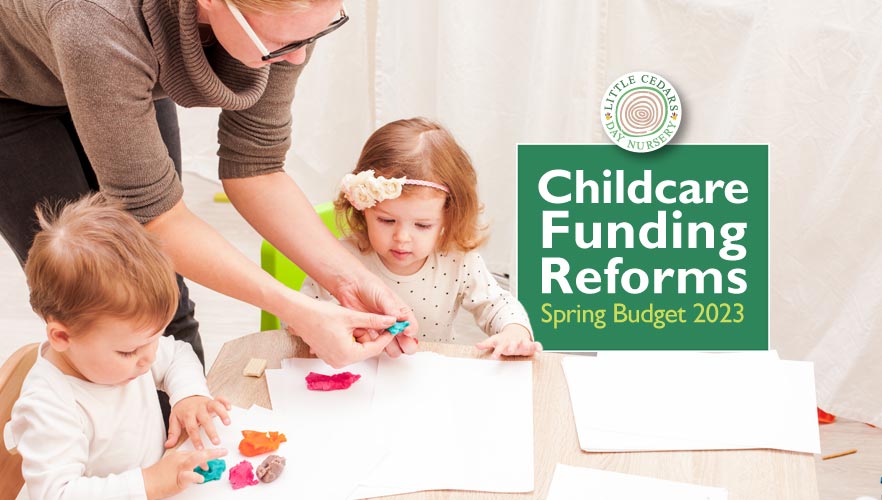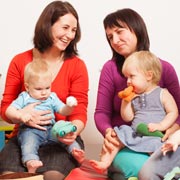
 March 15th 2023 saw the Chancellor of the Exchequer’s Spring Budget announcement, which included news of extra funding to cover costs for childcare. Crucially, the new funding will support childcare for infants as young as 9 months old for the first time, as well as including other positive changes. Although it’ll be introduced in stages, the free funding should be welcome news for those parents who will be eligible. Let’s take a look today at the proposed childcare changes, including which age groups will benefit, what extra funding is promised to support families and when the new help will become available. First, though, we’ll look at the main aims of the new funding.
March 15th 2023 saw the Chancellor of the Exchequer’s Spring Budget announcement, which included news of extra funding to cover costs for childcare. Crucially, the new funding will support childcare for infants as young as 9 months old for the first time, as well as including other positive changes. Although it’ll be introduced in stages, the free funding should be welcome news for those parents who will be eligible. Let’s take a look today at the proposed childcare changes, including which age groups will benefit, what extra funding is promised to support families and when the new help will become available. First, though, we’ll look at the main aims of the new funding.
The Aims of the New Childcare Funding
The proposed changes are aimed at helping families overcome current barriers to being able to work, for example because of childcare timing limitations and/or affordability. They should also help the nation, though. Helping parents — especially women — to return to the workplace more easily will boost both household income and career prospects. This, in turn, will also help fill some of the many vacancies in the workplace. So, it will indirectly help the nation through growth and inflows into the Exchequer as well as helping families directly. The press has, however, highlighted some frustration that the changes won’t happen soon enough for many, and are being introduced in stages. However, childcare providers will need time to adapt to the changes, for example to build extra capacity to cater for the extra demand. They will also need to adapt to some new rules around things like staff-to-child ratios.
“Almost half of non-working mothers said they would prefer to work if they could arrange suitable childcare.” (Jeremy Hunt, Chancellor of the Exchequer)
The Childcare Funding Improvements:
To sum up the new childcare funding enhancements, the Chancellor’s plans to help eligible families include the following:Childcare Funding Improvements Announced
Let’s have a closer look at these three areas, which will positively benefit the attainability of childcare for almost all under-fives:
1. Childcare Funding for Children from 9 Months
 The ‘main event’ in the Spring Budget from the perspective of childcare provision is the significant expansion of the ‘free hours’ schemes. Previously, only 3- and 4-year-olds living in England could get up to 30 free childcare hours per week, along with some 2-year-olds being eligible for 15 hours per week. However, the Chancellor has announced that 30 free weekly childcare hours will soon be extended to eligible children aged from just 9 months old. Eligibility criteria for these much younger children will be based on the same eligibility requirements as for 3- and 4-year-olds on the existing ’30 free hours’ scheme.
The ‘main event’ in the Spring Budget from the perspective of childcare provision is the significant expansion of the ‘free hours’ schemes. Previously, only 3- and 4-year-olds living in England could get up to 30 free childcare hours per week, along with some 2-year-olds being eligible for 15 hours per week. However, the Chancellor has announced that 30 free weekly childcare hours will soon be extended to eligible children aged from just 9 months old. Eligibility criteria for these much younger children will be based on the same eligibility requirements as for 3- and 4-year-olds on the existing ’30 free hours’ scheme.
“Significant reforms to childcare will remove barriers to work for nearly half a million parents with a child under 3 in England [who are] not working due to caring responsibilities … reducing discrimination against women and benefiting the wider economy in the process.”
This new support scheme for infants will be gradually phased in during the period running up to September 2025.
- First, 2-year-olds of working parents will become eligible for 15 hours of free childcare, for 38 weeks of the year, from April 2024. This will benefit up to 285,000 children.
- The scheme will then be extended to children aged from 9 months of age from September 2024, which will benefit up to an additional 640,000 children.
- Finally, from September 2025, the Chancellor says, “all eligible working parents of children aged 9 months up to 3 years will be able to access 30 free hours per week.”
- This is all in addition to existing schemes for 3- and 4-year-olds.
For those children who are eligible, it will mean that they will receive Government-funded childcare hours right from the age of 9 months, with 2-year-olds becoming eligible from just over a year’s time at time of writing (March 2023). With the 3-and-up funding schemes already in place, eligible little ones will then be supported with childcare right up until they start school around the age of five. That will be a game-changer for parents who want to get back into work immediately following any maternity/paternity leave.
“This will help with the cost of living, support education for the youngest children, and remove one of the biggest barriers to parents working.”
2. Universal Credit Changes for Childcare
 Some struggling parents in receipt of Universal Credit childcare support, who would like to move into work or increase existing working hours, will have subsidised childcare costs paid in advance under the new proposals. This is in contrast to the existing approach where all parents had to pay for the childcare upfront and then reclaim the costs retrospectively. Funding the childcare costs in advance will make the subsidised childcare costs much easier for the lowest-income families to afford from a practical, cash-flow point of view. It will also hopefully improve the situation whereby, currently, only 13% of eligible low-income families actually claim the childcare element of Universal Credit.
Some struggling parents in receipt of Universal Credit childcare support, who would like to move into work or increase existing working hours, will have subsidised childcare costs paid in advance under the new proposals. This is in contrast to the existing approach where all parents had to pay for the childcare upfront and then reclaim the costs retrospectively. Funding the childcare costs in advance will make the subsidised childcare costs much easier for the lowest-income families to afford from a practical, cash-flow point of view. It will also hopefully improve the situation whereby, currently, only 13% of eligible low-income families actually claim the childcare element of Universal Credit.
Only 13% of eligible low-income families currently claim the childcare element of Universal Credit.
Under the existing Universal Credit childcare scheme, eligible families can currently claim back up to 85% of childcare costs, up to a maximum of £646 per month for one child or £1,108 for two in most cases (follow the bold link for more details). However, under the new proposals announced in the Spring Budget in March 2023, eligible parents will soon be able to claim significantly more. Indeed, the increase is approximately 47% more, rising to £950.92 per month in childcare funding for a single child and £1,630.15 per month for two or more.
3. Wraparound Childcare ‘Pathfinder’ Scheme
 Although this website and our childcare service are geared to the early years age groups, it would be remiss of us not to include a brief overview of the enhancements that are being introduced for children of school age. These are coming in via proposed changes to what is known as ‘Wraparound Care’ as we’ll explain.
Although this website and our childcare service are geared to the early years age groups, it would be remiss of us not to include a brief overview of the enhancements that are being introduced for children of school age. These are coming in via proposed changes to what is known as ‘Wraparound Care’ as we’ll explain.
A major problem for many working parents of school-age children is that school hours are generally shorter than the adult’s working hours. This incompatibility creates a barrier to finding a workable childcare solution that would otherwise allow the parent to work during normal office hours. The new ‘Wraparound Pathfinder Scheme’, proposed in the Chancellor’s Spring 2023 Budget, is designed to provide childcare for the children even during those ‘mismatched’ hours. For example, wraparound childcare will start to cover the period from 3pm, when many children finish their school day, to 6pm when parents may finish their working day. Similarly the new provision will allow children to be dropped off earlier in the day, so that parents can get to work by, for example, 9am after dropping children to their childcare providers in the preceding hour. Under the changes proposed in the Chancellor’s Spring Budget, parents of school-age children will be able to drop them off as early as 8am and pick them up as late as 6pm during the working week. The scheme will first be tested, however, and rolled out nationally, if successful, from the academic year starting in 2024.
Benefiting Parents, Children & Society
The changes proposed in the Chancellor’s Spring Budget 2023 should improve the lives and careers of parents of young children, improve access to all-important early years education for those little ones and help to support economic growth for the nation.
“An early start in early years education benefits children and spending more hours in early education between age 2 and 3 has immediate positive impacts, including more prosocial behaviour, fewer emotional symptoms and peer problems.”
The Chancellor also announced additional support measures for childcare providers, to help them adapt and prepare for all the new changes and additional capacity that will be required. Learn more about the Chancellor’s announcements for childcare reforms on the Government’s Education Hub.
Little Cedars Nursery, Streatham
High Quality Childcare Provision for Babies, Toddlers & Preschoolers in Streatham

 Little Cedars is a high quality nursery and pre-school located in Streatham, London SW16. Recognised as a good childcare provider by Ofsted, we cater for babies aged from 3 months and children aged up to five years. We support the various Government schemes that allow eligible families to access free childcare.
Little Cedars is a high quality nursery and pre-school located in Streatham, London SW16. Recognised as a good childcare provider by Ofsted, we cater for babies aged from 3 months and children aged up to five years. We support the various Government schemes that allow eligible families to access free childcare.
Get in touch today to register your baby or child for a childcare place at Little Cedars Nursery. We’re happy to answer questions and/or to show you and your little one around the nursery/pre-school too. Why not visit and see how well they fit in! Please choose a button to get started with your enquiry or application:
Little Cedars Nursery is located in Streatham, near Streatham Hill, Streatham Common, Streatham Park, Furzedown, Tooting, Balham, Norbury, Colliers Wood, West Norwood, Wandsworth, Clapham and Brixton.


 June 2022 has seen the release of a new set of recommendations that outline ways to reduce the likelihood of sleep-related deaths amongst babies and infants up to the age of 1. This includes, but is not limited to, deaths related to Sudden Infant Death Syndrome (SIDS). Sadly, SIDS and other sleep-related issues are responsible for nearly 200 infant deaths in the UK each year and up to a staggering 3,500 every year in the United States. Perhaps even more surprisingly, that last number has not reduced at all in the last 30 or so years. This new set of recommendations from experts in the U.S. aims to change that and is something that all parents need to take a look at if they have a baby or infant. Let’s take a look at the new guidance …
June 2022 has seen the release of a new set of recommendations that outline ways to reduce the likelihood of sleep-related deaths amongst babies and infants up to the age of 1. This includes, but is not limited to, deaths related to Sudden Infant Death Syndrome (SIDS). Sadly, SIDS and other sleep-related issues are responsible for nearly 200 infant deaths in the UK each year and up to a staggering 3,500 every year in the United States. Perhaps even more surprisingly, that last number has not reduced at all in the last 30 or so years. This new set of recommendations from experts in the U.S. aims to change that and is something that all parents need to take a look at if they have a baby or infant. Let’s take a look at the new guidance … PLEASE NOTE: we have summarised key points from the new guidance in good faith but advise parents/carers of babies and infants to do their own research.
PLEASE NOTE: we have summarised key points from the new guidance in good faith but advise parents/carers of babies and infants to do their own research. 